Critical Analysis: Current Issues in Cancer Healthcare Management
VerifiedAdded on 2023/06/13
|19
|5319
|82
Essay
AI Summary
This essay provides an overview of the current issues in cancer healthcare management, emphasizing the challenges and opportunities in cancer prevention, treatment, and care. It highlights the increasing incidence and mortality rates of cancer globally and in the UK, necessitating a comprehensive approach involving local and government policies, ethical considerations, and financial strategies. The essay delves into specific policies aimed at reducing smoking, obesity, and harmful drinking, as well as initiatives for early cancer detection through awareness campaigns and screening programs. It also addresses ethical dilemmas related to public health communication, over-diagnosis, and patient consent in research. Furthermore, the essay explores the financial burden of cancer treatment, advocating for strategies to balance treatment efficacy with cost-effectiveness. The ultimate goal is to improve healthcare management practices and outcomes for cancer patients and survivors.
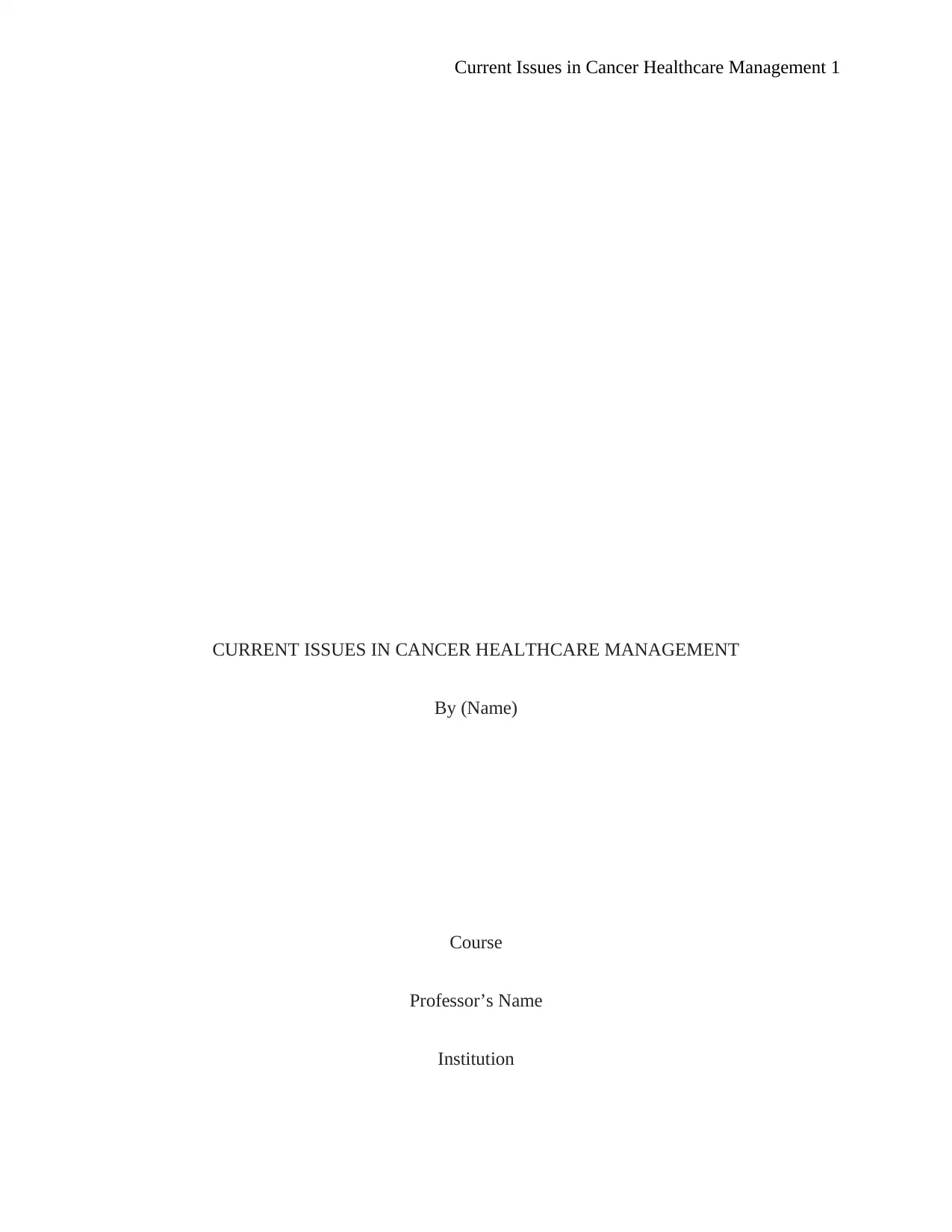
Current Issues in Cancer Healthcare Management 1
CURRENT ISSUES IN CANCER HEALTHCARE MANAGEMENT
By (Name)
Course
Professor’s Name
Institution
CURRENT ISSUES IN CANCER HEALTHCARE MANAGEMENT
By (Name)
Course
Professor’s Name
Institution
Paraphrase This Document
Need a fresh take? Get an instant paraphrase of this document with our AI Paraphraser
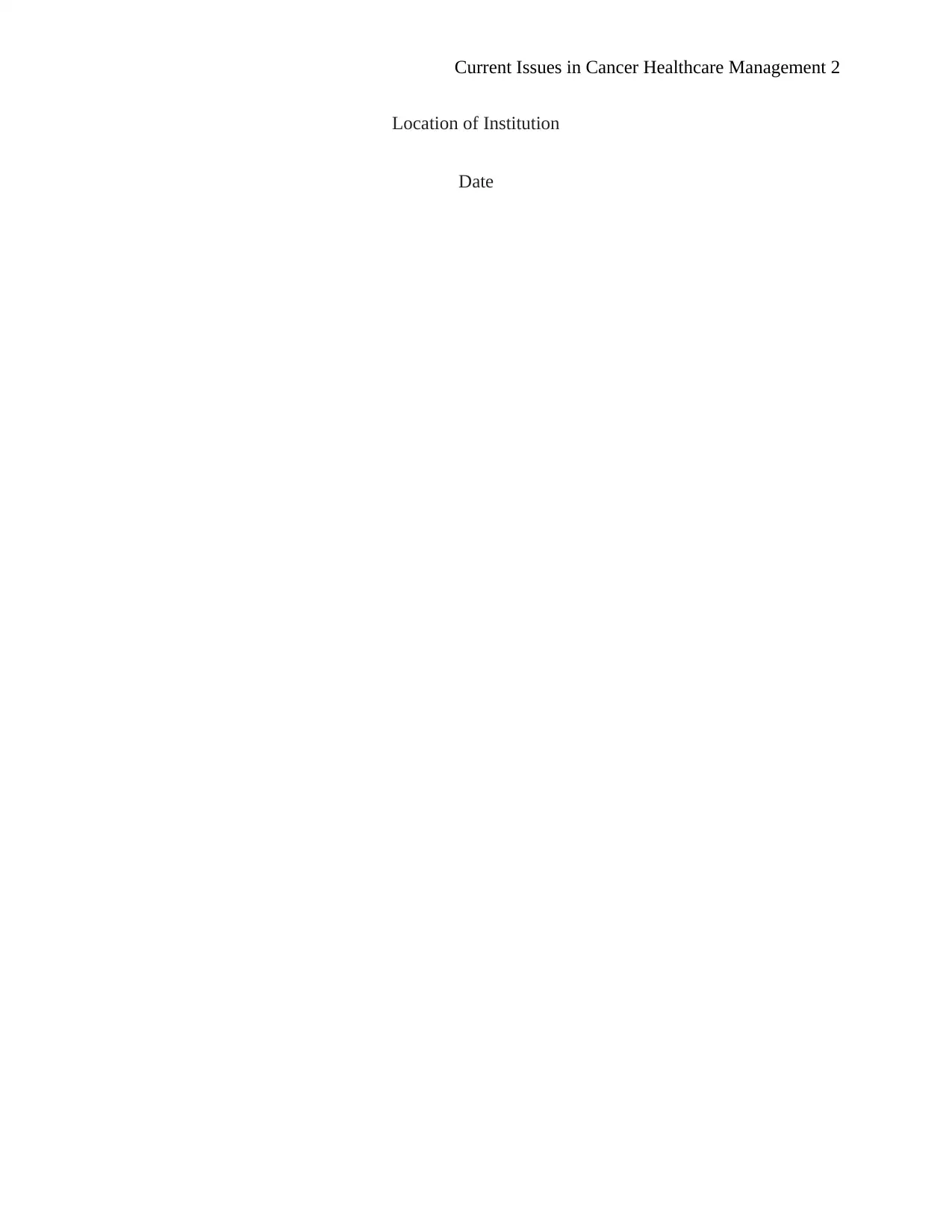
Current Issues in Cancer Healthcare Management 2
Location of Institution
Date
Location of Institution
Date
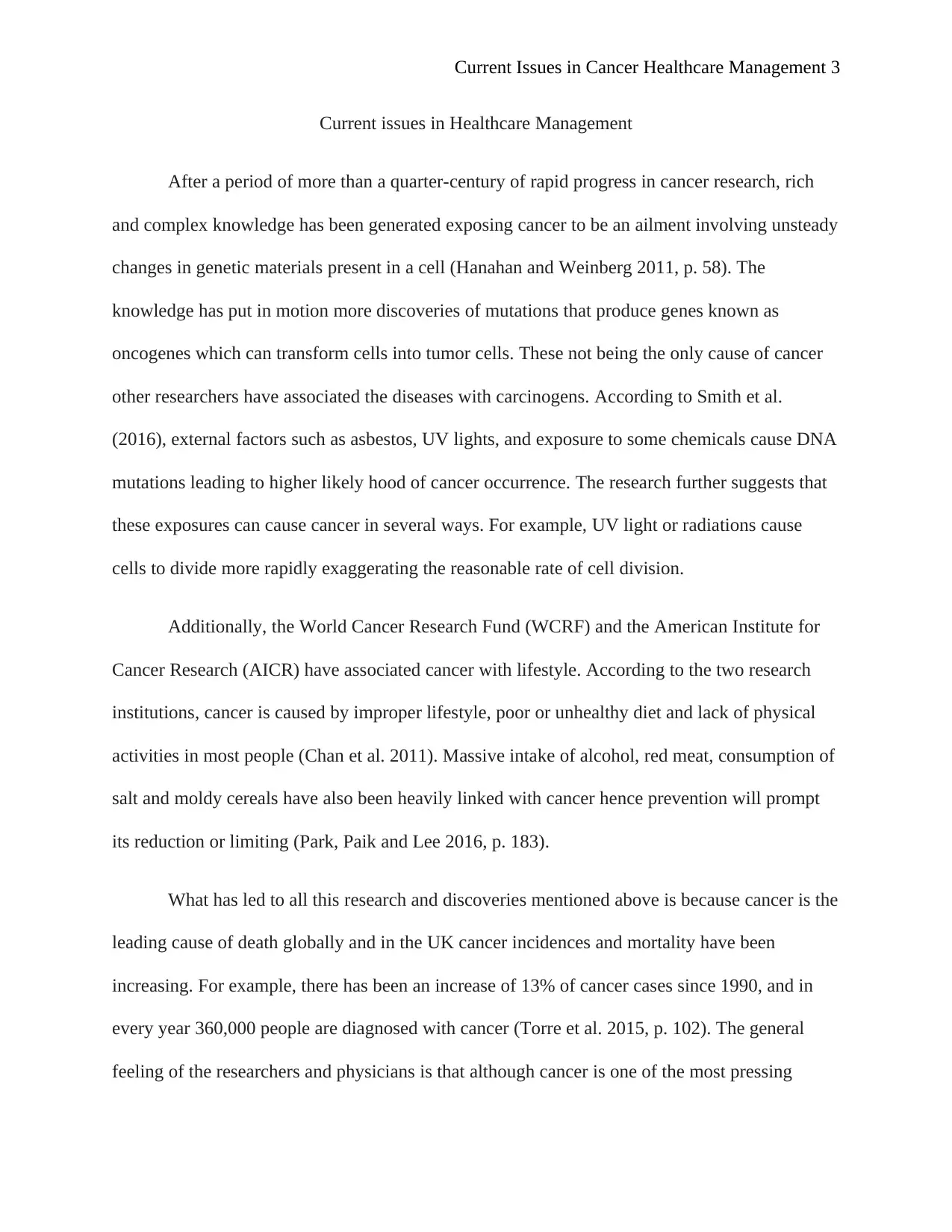
Current Issues in Cancer Healthcare Management 3
Current issues in Healthcare Management
After a period of more than a quarter-century of rapid progress in cancer research, rich
and complex knowledge has been generated exposing cancer to be an ailment involving unsteady
changes in genetic materials present in a cell (Hanahan and Weinberg 2011, p. 58). The
knowledge has put in motion more discoveries of mutations that produce genes known as
oncogenes which can transform cells into tumor cells. These not being the only cause of cancer
other researchers have associated the diseases with carcinogens. According to Smith et al.
(2016), external factors such as asbestos, UV lights, and exposure to some chemicals cause DNA
mutations leading to higher likely hood of cancer occurrence. The research further suggests that
these exposures can cause cancer in several ways. For example, UV light or radiations cause
cells to divide more rapidly exaggerating the reasonable rate of cell division.
Additionally, the World Cancer Research Fund (WCRF) and the American Institute for
Cancer Research (AICR) have associated cancer with lifestyle. According to the two research
institutions, cancer is caused by improper lifestyle, poor or unhealthy diet and lack of physical
activities in most people (Chan et al. 2011). Massive intake of alcohol, red meat, consumption of
salt and moldy cereals have also been heavily linked with cancer hence prevention will prompt
its reduction or limiting (Park, Paik and Lee 2016, p. 183).
What has led to all this research and discoveries mentioned above is because cancer is the
leading cause of death globally and in the UK cancer incidences and mortality have been
increasing. For example, there has been an increase of 13% of cancer cases since 1990, and in
every year 360,000 people are diagnosed with cancer (Torre et al. 2015, p. 102). The general
feeling of the researchers and physicians is that although cancer is one of the most pressing
Current issues in Healthcare Management
After a period of more than a quarter-century of rapid progress in cancer research, rich
and complex knowledge has been generated exposing cancer to be an ailment involving unsteady
changes in genetic materials present in a cell (Hanahan and Weinberg 2011, p. 58). The
knowledge has put in motion more discoveries of mutations that produce genes known as
oncogenes which can transform cells into tumor cells. These not being the only cause of cancer
other researchers have associated the diseases with carcinogens. According to Smith et al.
(2016), external factors such as asbestos, UV lights, and exposure to some chemicals cause DNA
mutations leading to higher likely hood of cancer occurrence. The research further suggests that
these exposures can cause cancer in several ways. For example, UV light or radiations cause
cells to divide more rapidly exaggerating the reasonable rate of cell division.
Additionally, the World Cancer Research Fund (WCRF) and the American Institute for
Cancer Research (AICR) have associated cancer with lifestyle. According to the two research
institutions, cancer is caused by improper lifestyle, poor or unhealthy diet and lack of physical
activities in most people (Chan et al. 2011). Massive intake of alcohol, red meat, consumption of
salt and moldy cereals have also been heavily linked with cancer hence prevention will prompt
its reduction or limiting (Park, Paik and Lee 2016, p. 183).
What has led to all this research and discoveries mentioned above is because cancer is the
leading cause of death globally and in the UK cancer incidences and mortality have been
increasing. For example, there has been an increase of 13% of cancer cases since 1990, and in
every year 360,000 people are diagnosed with cancer (Torre et al. 2015, p. 102). The general
feeling of the researchers and physicians is that although cancer is one of the most pressing
⊘ This is a preview!⊘
Do you want full access?
Subscribe today to unlock all pages.

Trusted by 1+ million students worldwide
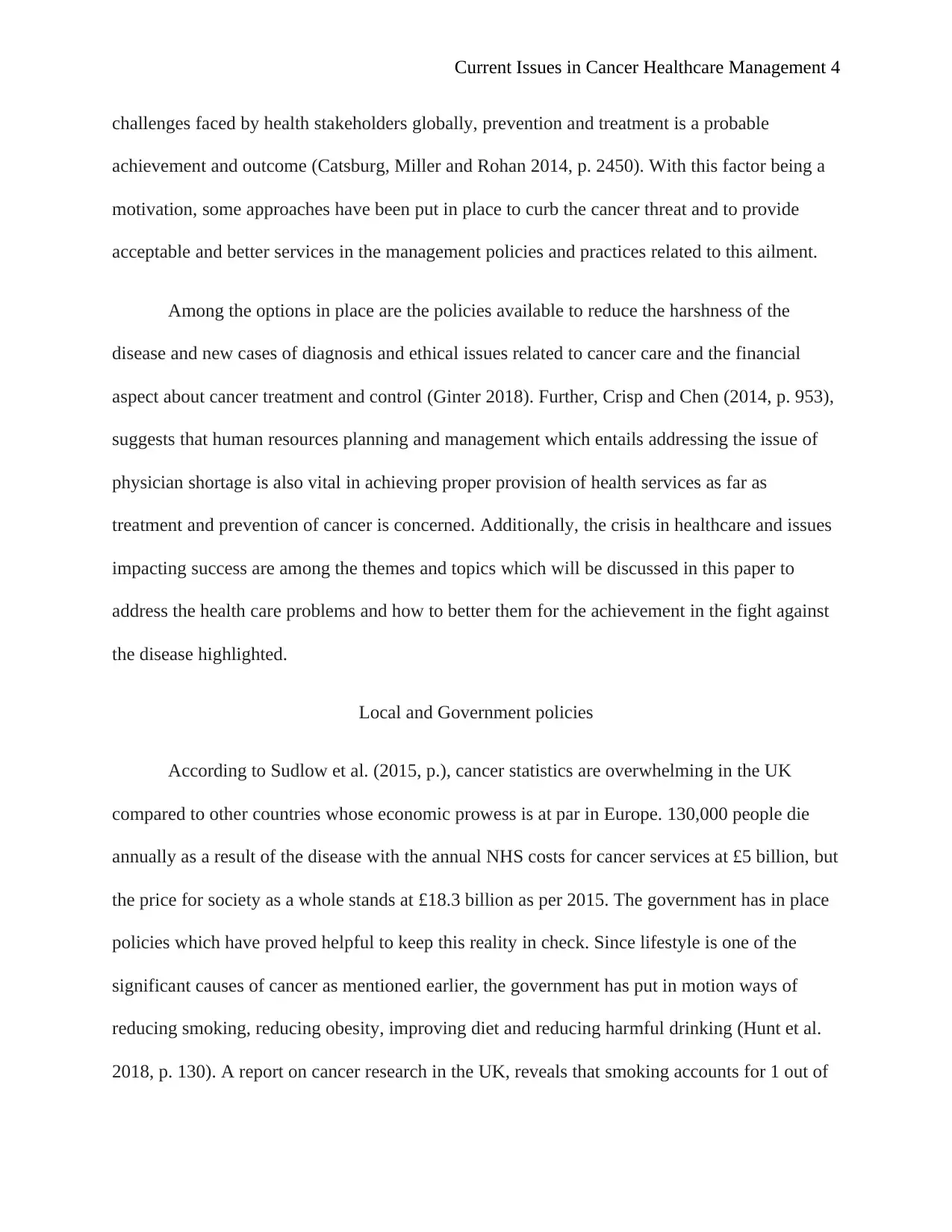
Current Issues in Cancer Healthcare Management 4
challenges faced by health stakeholders globally, prevention and treatment is a probable
achievement and outcome (Catsburg, Miller and Rohan 2014, p. 2450). With this factor being a
motivation, some approaches have been put in place to curb the cancer threat and to provide
acceptable and better services in the management policies and practices related to this ailment.
Among the options in place are the policies available to reduce the harshness of the
disease and new cases of diagnosis and ethical issues related to cancer care and the financial
aspect about cancer treatment and control (Ginter 2018). Further, Crisp and Chen (2014, p. 953),
suggests that human resources planning and management which entails addressing the issue of
physician shortage is also vital in achieving proper provision of health services as far as
treatment and prevention of cancer is concerned. Additionally, the crisis in healthcare and issues
impacting success are among the themes and topics which will be discussed in this paper to
address the health care problems and how to better them for the achievement in the fight against
the disease highlighted.
Local and Government policies
According to Sudlow et al. (2015, p.), cancer statistics are overwhelming in the UK
compared to other countries whose economic prowess is at par in Europe. 130,000 people die
annually as a result of the disease with the annual NHS costs for cancer services at £5 billion, but
the price for society as a whole stands at £18.3 billion as per 2015. The government has in place
policies which have proved helpful to keep this reality in check. Since lifestyle is one of the
significant causes of cancer as mentioned earlier, the government has put in motion ways of
reducing smoking, reducing obesity, improving diet and reducing harmful drinking (Hunt et al.
2018, p. 130). A report on cancer research in the UK, reveals that smoking accounts for 1 out of
challenges faced by health stakeholders globally, prevention and treatment is a probable
achievement and outcome (Catsburg, Miller and Rohan 2014, p. 2450). With this factor being a
motivation, some approaches have been put in place to curb the cancer threat and to provide
acceptable and better services in the management policies and practices related to this ailment.
Among the options in place are the policies available to reduce the harshness of the
disease and new cases of diagnosis and ethical issues related to cancer care and the financial
aspect about cancer treatment and control (Ginter 2018). Further, Crisp and Chen (2014, p. 953),
suggests that human resources planning and management which entails addressing the issue of
physician shortage is also vital in achieving proper provision of health services as far as
treatment and prevention of cancer is concerned. Additionally, the crisis in healthcare and issues
impacting success are among the themes and topics which will be discussed in this paper to
address the health care problems and how to better them for the achievement in the fight against
the disease highlighted.
Local and Government policies
According to Sudlow et al. (2015, p.), cancer statistics are overwhelming in the UK
compared to other countries whose economic prowess is at par in Europe. 130,000 people die
annually as a result of the disease with the annual NHS costs for cancer services at £5 billion, but
the price for society as a whole stands at £18.3 billion as per 2015. The government has in place
policies which have proved helpful to keep this reality in check. Since lifestyle is one of the
significant causes of cancer as mentioned earlier, the government has put in motion ways of
reducing smoking, reducing obesity, improving diet and reducing harmful drinking (Hunt et al.
2018, p. 130). A report on cancer research in the UK, reveals that smoking accounts for 1 out of
Paraphrase This Document
Need a fresh take? Get an instant paraphrase of this document with our AI Paraphraser
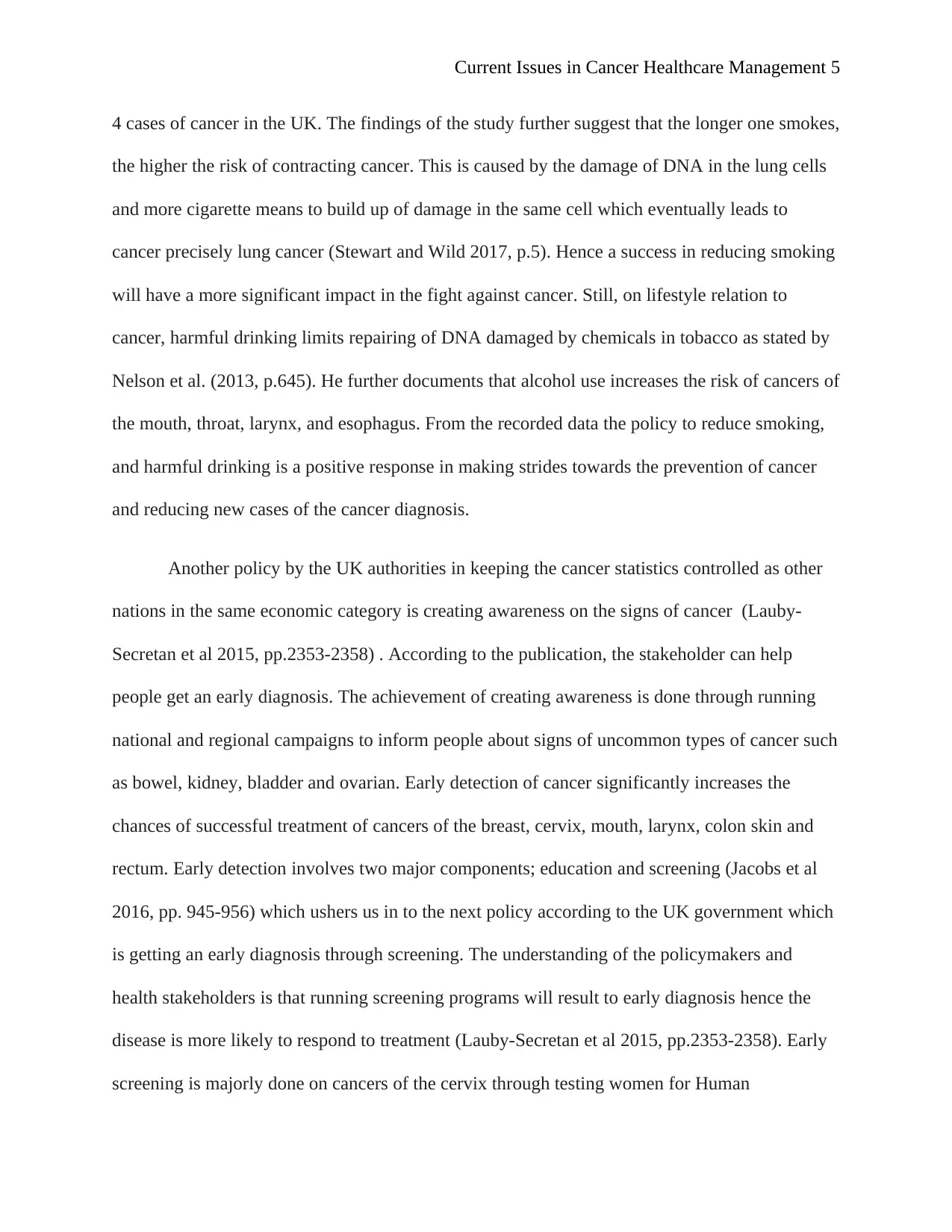
Current Issues in Cancer Healthcare Management 5
4 cases of cancer in the UK. The findings of the study further suggest that the longer one smokes,
the higher the risk of contracting cancer. This is caused by the damage of DNA in the lung cells
and more cigarette means to build up of damage in the same cell which eventually leads to
cancer precisely lung cancer (Stewart and Wild 2017, p.5). Hence a success in reducing smoking
will have a more significant impact in the fight against cancer. Still, on lifestyle relation to
cancer, harmful drinking limits repairing of DNA damaged by chemicals in tobacco as stated by
Nelson et al. (2013, p.645). He further documents that alcohol use increases the risk of cancers of
the mouth, throat, larynx, and esophagus. From the recorded data the policy to reduce smoking,
and harmful drinking is a positive response in making strides towards the prevention of cancer
and reducing new cases of the cancer diagnosis.
Another policy by the UK authorities in keeping the cancer statistics controlled as other
nations in the same economic category is creating awareness on the signs of cancer (Lauby-
Secretan et al 2015, pp.2353-2358) . According to the publication, the stakeholder can help
people get an early diagnosis. The achievement of creating awareness is done through running
national and regional campaigns to inform people about signs of uncommon types of cancer such
as bowel, kidney, bladder and ovarian. Early detection of cancer significantly increases the
chances of successful treatment of cancers of the breast, cervix, mouth, larynx, colon skin and
rectum. Early detection involves two major components; education and screening (Jacobs et al
2016, pp. 945-956) which ushers us in to the next policy according to the UK government which
is getting an early diagnosis through screening. The understanding of the policymakers and
health stakeholders is that running screening programs will result to early diagnosis hence the
disease is more likely to respond to treatment (Lauby-Secretan et al 2015, pp.2353-2358). Early
screening is majorly done on cancers of the cervix through testing women for Human
4 cases of cancer in the UK. The findings of the study further suggest that the longer one smokes,
the higher the risk of contracting cancer. This is caused by the damage of DNA in the lung cells
and more cigarette means to build up of damage in the same cell which eventually leads to
cancer precisely lung cancer (Stewart and Wild 2017, p.5). Hence a success in reducing smoking
will have a more significant impact in the fight against cancer. Still, on lifestyle relation to
cancer, harmful drinking limits repairing of DNA damaged by chemicals in tobacco as stated by
Nelson et al. (2013, p.645). He further documents that alcohol use increases the risk of cancers of
the mouth, throat, larynx, and esophagus. From the recorded data the policy to reduce smoking,
and harmful drinking is a positive response in making strides towards the prevention of cancer
and reducing new cases of the cancer diagnosis.
Another policy by the UK authorities in keeping the cancer statistics controlled as other
nations in the same economic category is creating awareness on the signs of cancer (Lauby-
Secretan et al 2015, pp.2353-2358) . According to the publication, the stakeholder can help
people get an early diagnosis. The achievement of creating awareness is done through running
national and regional campaigns to inform people about signs of uncommon types of cancer such
as bowel, kidney, bladder and ovarian. Early detection of cancer significantly increases the
chances of successful treatment of cancers of the breast, cervix, mouth, larynx, colon skin and
rectum. Early detection involves two major components; education and screening (Jacobs et al
2016, pp. 945-956) which ushers us in to the next policy according to the UK government which
is getting an early diagnosis through screening. The understanding of the policymakers and
health stakeholders is that running screening programs will result to early diagnosis hence the
disease is more likely to respond to treatment (Lauby-Secretan et al 2015, pp.2353-2358). Early
screening is majorly done on cancers of the cervix through testing women for Human
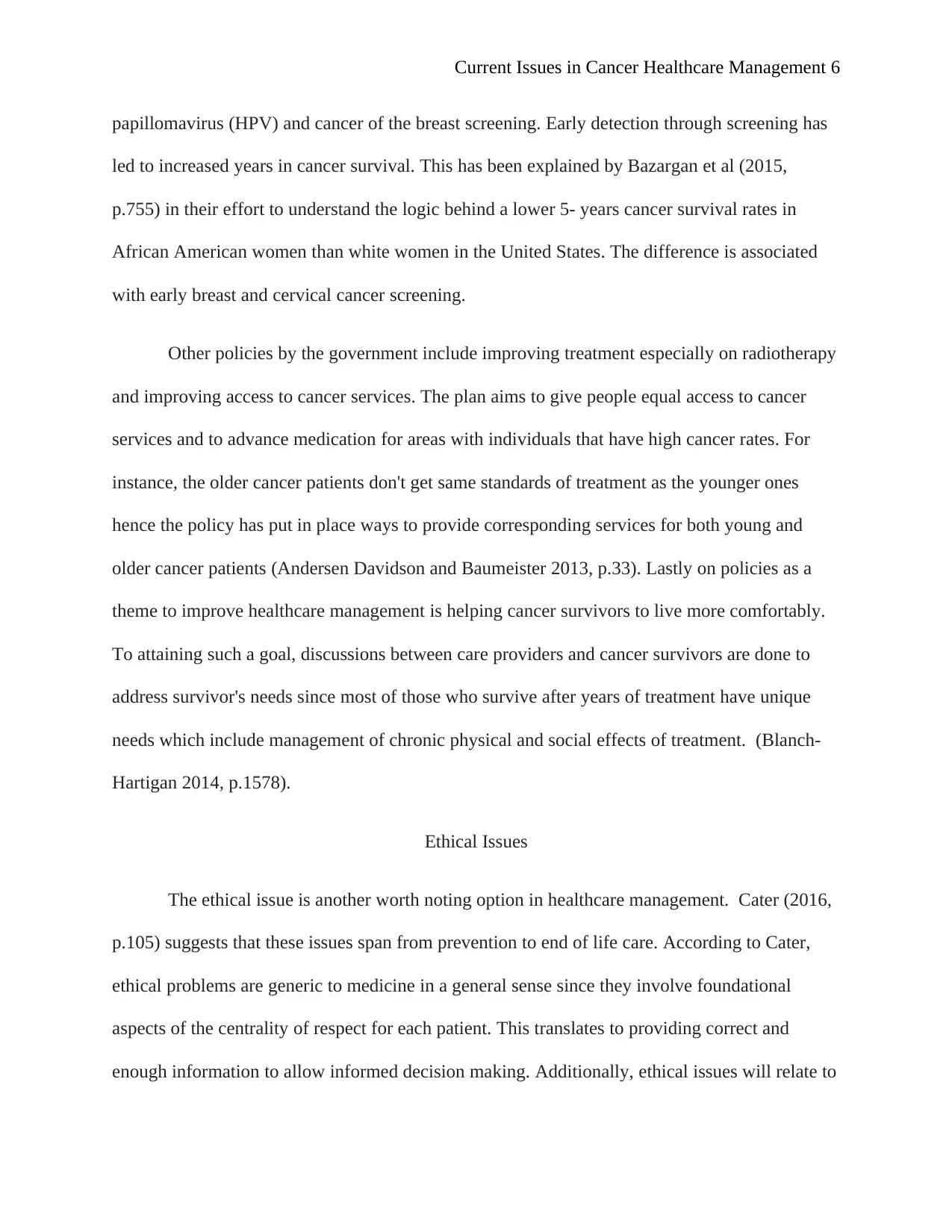
Current Issues in Cancer Healthcare Management 6
papillomavirus (HPV) and cancer of the breast screening. Early detection through screening has
led to increased years in cancer survival. This has been explained by Bazargan et al (2015,
p.755) in their effort to understand the logic behind a lower 5- years cancer survival rates in
African American women than white women in the United States. The difference is associated
with early breast and cervical cancer screening.
Other policies by the government include improving treatment especially on radiotherapy
and improving access to cancer services. The plan aims to give people equal access to cancer
services and to advance medication for areas with individuals that have high cancer rates. For
instance, the older cancer patients don't get same standards of treatment as the younger ones
hence the policy has put in place ways to provide corresponding services for both young and
older cancer patients (Andersen Davidson and Baumeister 2013, p.33). Lastly on policies as a
theme to improve healthcare management is helping cancer survivors to live more comfortably.
To attaining such a goal, discussions between care providers and cancer survivors are done to
address survivor's needs since most of those who survive after years of treatment have unique
needs which include management of chronic physical and social effects of treatment. (Blanch-
Hartigan 2014, p.1578).
Ethical Issues
The ethical issue is another worth noting option in healthcare management. Cater (2016,
p.105) suggests that these issues span from prevention to end of life care. According to Cater,
ethical problems are generic to medicine in a general sense since they involve foundational
aspects of the centrality of respect for each patient. This translates to providing correct and
enough information to allow informed decision making. Additionally, ethical issues will relate to
papillomavirus (HPV) and cancer of the breast screening. Early detection through screening has
led to increased years in cancer survival. This has been explained by Bazargan et al (2015,
p.755) in their effort to understand the logic behind a lower 5- years cancer survival rates in
African American women than white women in the United States. The difference is associated
with early breast and cervical cancer screening.
Other policies by the government include improving treatment especially on radiotherapy
and improving access to cancer services. The plan aims to give people equal access to cancer
services and to advance medication for areas with individuals that have high cancer rates. For
instance, the older cancer patients don't get same standards of treatment as the younger ones
hence the policy has put in place ways to provide corresponding services for both young and
older cancer patients (Andersen Davidson and Baumeister 2013, p.33). Lastly on policies as a
theme to improve healthcare management is helping cancer survivors to live more comfortably.
To attaining such a goal, discussions between care providers and cancer survivors are done to
address survivor's needs since most of those who survive after years of treatment have unique
needs which include management of chronic physical and social effects of treatment. (Blanch-
Hartigan 2014, p.1578).
Ethical Issues
The ethical issue is another worth noting option in healthcare management. Cater (2016,
p.105) suggests that these issues span from prevention to end of life care. According to Cater,
ethical problems are generic to medicine in a general sense since they involve foundational
aspects of the centrality of respect for each patient. This translates to providing correct and
enough information to allow informed decision making. Additionally, ethical issues will relate to
⊘ This is a preview!⊘
Do you want full access?
Subscribe today to unlock all pages.

Trusted by 1+ million students worldwide

Current Issues in Cancer Healthcare Management 7
the distribution of health resources equally and removal of vast health differences in healthcare
opportunities. Other ethical problems revolve around public health communication about cancer
risk, over-diagnosis recognition and the risks related when recommending a cancer screening
program and treatment (Xafis 2016, p. 23).
For instance, on the issue of messaging in the control of excessive alcohol consumption,
Muhlack et al. (2016, p.97) discuss how the practice is rampant while it's a known risk factor for
cancer and whether the way the legislature handles the issue is justified. A proposed strategy of
reducing alcohol consumption in some countries like Australia, for instance, is including a
warning label on all alcohol products which worked in tobacco control. Although such warnings
have been given on the ground that it’s only for information only, McDonough (2016) argues
that the real aim is a behavioral change that will result in harmful reduction. The approach may
not be productive since behavior change may not be steered by information alone and the society
should be allowed to make their informed choices without legislative interference. For a win-win
situation to be attained a balance must be struck between the public's wholesome needs and
proposed interventions (Louise et al. 2015, p.6)
Most researchers have argued that routine testing and screening for cancer for earlier
detection of the symptoms result in decreased mortality. This fact has been proved severally and
encouraged, but Carter (2016, p.106) states that even if a particular population benefits not ever
one will help. In some individuals, the detected cancer symptoms may never cause harm what is
known as over-diagnosis which results to further testing, psychological medication stress. Before
testing and screening, an individual should be well informed and told the risks involved in the
process to enable them to make decisions and make an informed judgment whether to participate
in a mass screening program.
the distribution of health resources equally and removal of vast health differences in healthcare
opportunities. Other ethical problems revolve around public health communication about cancer
risk, over-diagnosis recognition and the risks related when recommending a cancer screening
program and treatment (Xafis 2016, p. 23).
For instance, on the issue of messaging in the control of excessive alcohol consumption,
Muhlack et al. (2016, p.97) discuss how the practice is rampant while it's a known risk factor for
cancer and whether the way the legislature handles the issue is justified. A proposed strategy of
reducing alcohol consumption in some countries like Australia, for instance, is including a
warning label on all alcohol products which worked in tobacco control. Although such warnings
have been given on the ground that it’s only for information only, McDonough (2016) argues
that the real aim is a behavioral change that will result in harmful reduction. The approach may
not be productive since behavior change may not be steered by information alone and the society
should be allowed to make their informed choices without legislative interference. For a win-win
situation to be attained a balance must be struck between the public's wholesome needs and
proposed interventions (Louise et al. 2015, p.6)
Most researchers have argued that routine testing and screening for cancer for earlier
detection of the symptoms result in decreased mortality. This fact has been proved severally and
encouraged, but Carter (2016, p.106) states that even if a particular population benefits not ever
one will help. In some individuals, the detected cancer symptoms may never cause harm what is
known as over-diagnosis which results to further testing, psychological medication stress. Before
testing and screening, an individual should be well informed and told the risks involved in the
process to enable them to make decisions and make an informed judgment whether to participate
in a mass screening program.
Paraphrase This Document
Need a fresh take? Get an instant paraphrase of this document with our AI Paraphraser
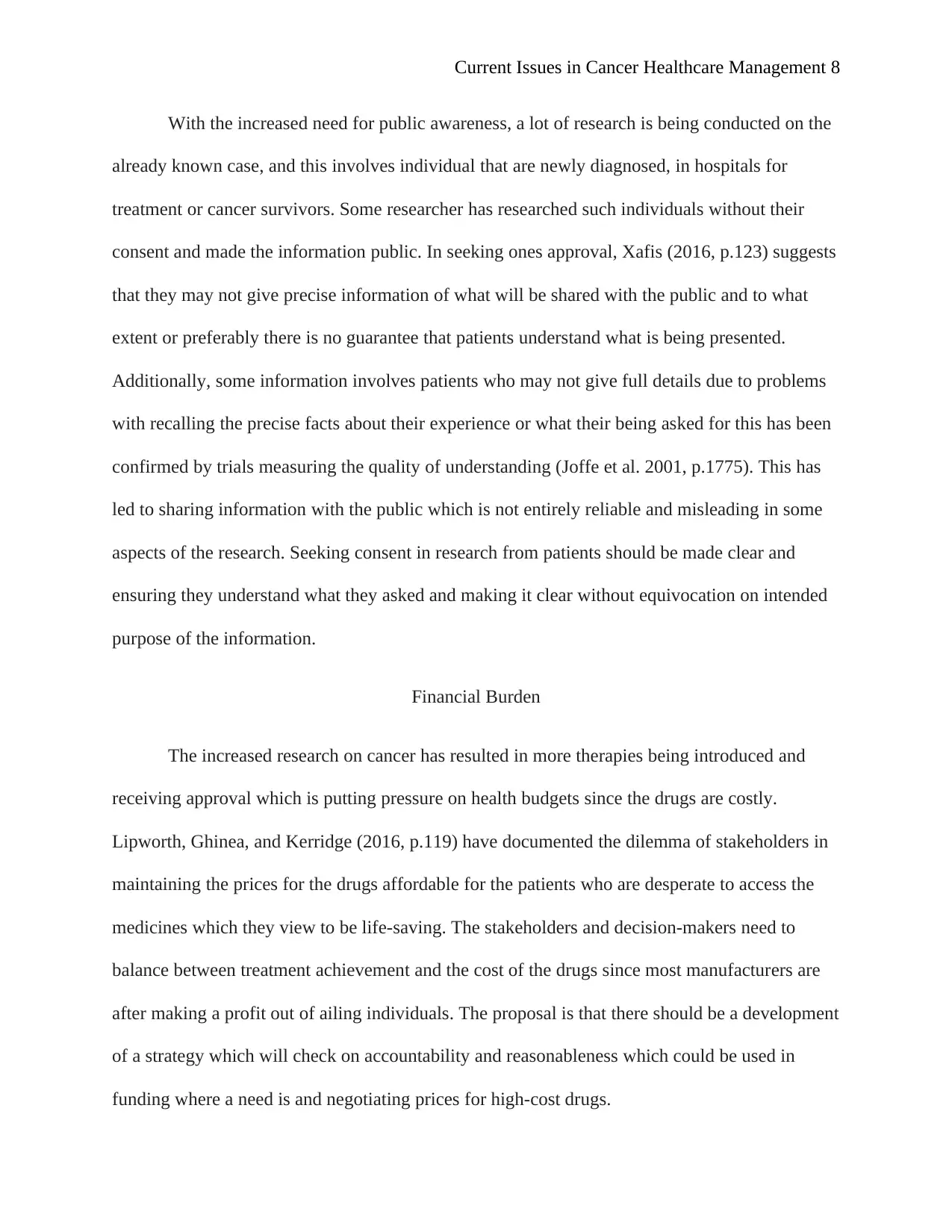
Current Issues in Cancer Healthcare Management 8
With the increased need for public awareness, a lot of research is being conducted on the
already known case, and this involves individual that are newly diagnosed, in hospitals for
treatment or cancer survivors. Some researcher has researched such individuals without their
consent and made the information public. In seeking ones approval, Xafis (2016, p.123) suggests
that they may not give precise information of what will be shared with the public and to what
extent or preferably there is no guarantee that patients understand what is being presented.
Additionally, some information involves patients who may not give full details due to problems
with recalling the precise facts about their experience or what their being asked for this has been
confirmed by trials measuring the quality of understanding (Joffe et al. 2001, p.1775). This has
led to sharing information with the public which is not entirely reliable and misleading in some
aspects of the research. Seeking consent in research from patients should be made clear and
ensuring they understand what they asked and making it clear without equivocation on intended
purpose of the information.
Financial Burden
The increased research on cancer has resulted in more therapies being introduced and
receiving approval which is putting pressure on health budgets since the drugs are costly.
Lipworth, Ghinea, and Kerridge (2016, p.119) have documented the dilemma of stakeholders in
maintaining the prices for the drugs affordable for the patients who are desperate to access the
medicines which they view to be life-saving. The stakeholders and decision-makers need to
balance between treatment achievement and the cost of the drugs since most manufacturers are
after making a profit out of ailing individuals. The proposal is that there should be a development
of a strategy which will check on accountability and reasonableness which could be used in
funding where a need is and negotiating prices for high-cost drugs.
With the increased need for public awareness, a lot of research is being conducted on the
already known case, and this involves individual that are newly diagnosed, in hospitals for
treatment or cancer survivors. Some researcher has researched such individuals without their
consent and made the information public. In seeking ones approval, Xafis (2016, p.123) suggests
that they may not give precise information of what will be shared with the public and to what
extent or preferably there is no guarantee that patients understand what is being presented.
Additionally, some information involves patients who may not give full details due to problems
with recalling the precise facts about their experience or what their being asked for this has been
confirmed by trials measuring the quality of understanding (Joffe et al. 2001, p.1775). This has
led to sharing information with the public which is not entirely reliable and misleading in some
aspects of the research. Seeking consent in research from patients should be made clear and
ensuring they understand what they asked and making it clear without equivocation on intended
purpose of the information.
Financial Burden
The increased research on cancer has resulted in more therapies being introduced and
receiving approval which is putting pressure on health budgets since the drugs are costly.
Lipworth, Ghinea, and Kerridge (2016, p.119) have documented the dilemma of stakeholders in
maintaining the prices for the drugs affordable for the patients who are desperate to access the
medicines which they view to be life-saving. The stakeholders and decision-makers need to
balance between treatment achievement and the cost of the drugs since most manufacturers are
after making a profit out of ailing individuals. The proposal is that there should be a development
of a strategy which will check on accountability and reasonableness which could be used in
funding where a need is and negotiating prices for high-cost drugs.
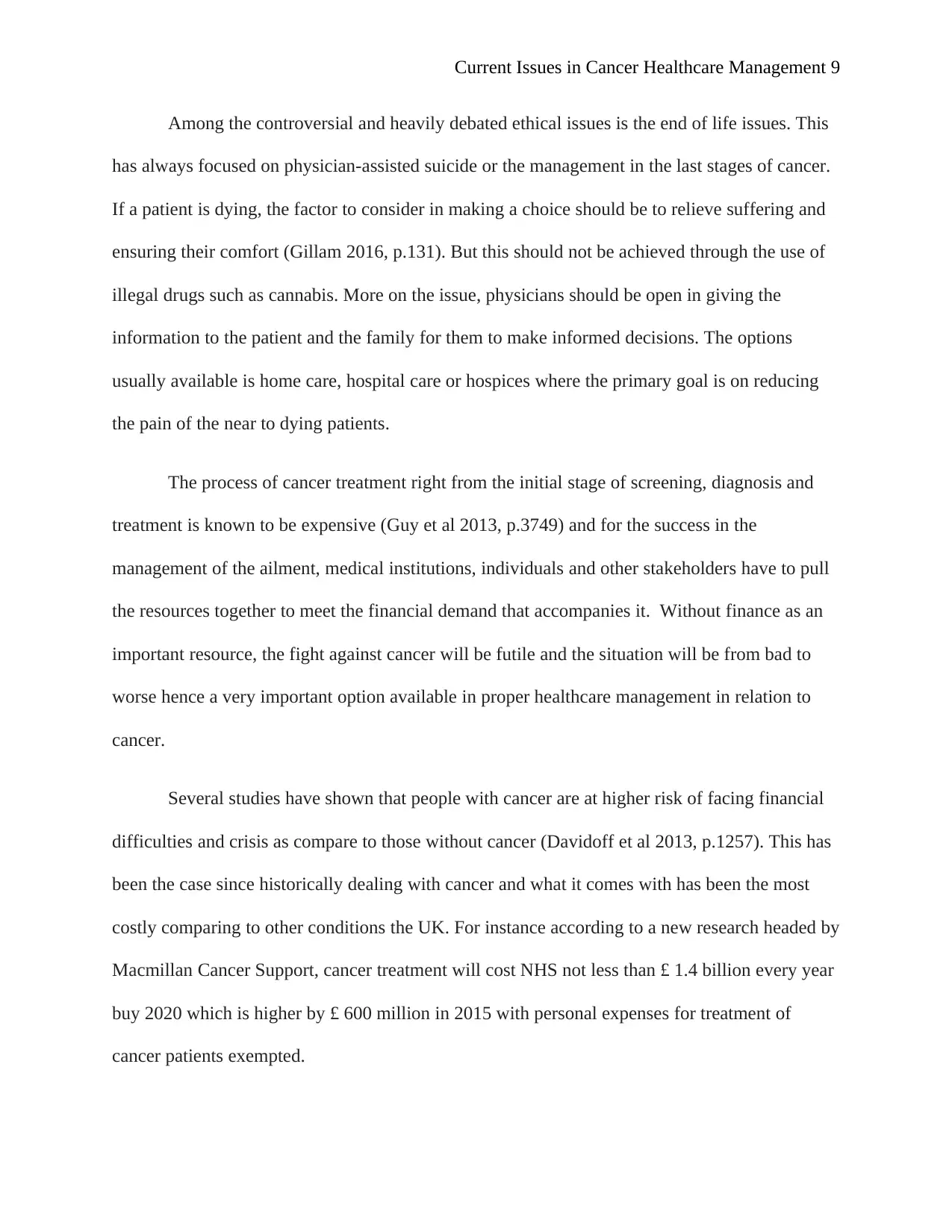
Current Issues in Cancer Healthcare Management 9
Among the controversial and heavily debated ethical issues is the end of life issues. This
has always focused on physician-assisted suicide or the management in the last stages of cancer.
If a patient is dying, the factor to consider in making a choice should be to relieve suffering and
ensuring their comfort (Gillam 2016, p.131). But this should not be achieved through the use of
illegal drugs such as cannabis. More on the issue, physicians should be open in giving the
information to the patient and the family for them to make informed decisions. The options
usually available is home care, hospital care or hospices where the primary goal is on reducing
the pain of the near to dying patients.
The process of cancer treatment right from the initial stage of screening, diagnosis and
treatment is known to be expensive (Guy et al 2013, p.3749) and for the success in the
management of the ailment, medical institutions, individuals and other stakeholders have to pull
the resources together to meet the financial demand that accompanies it. Without finance as an
important resource, the fight against cancer will be futile and the situation will be from bad to
worse hence a very important option available in proper healthcare management in relation to
cancer.
Several studies have shown that people with cancer are at higher risk of facing financial
difficulties and crisis as compare to those without cancer (Davidoff et al 2013, p.1257). This has
been the case since historically dealing with cancer and what it comes with has been the most
costly comparing to other conditions the UK. For instance according to a new research headed by
Macmillan Cancer Support, cancer treatment will cost NHS not less than £ 1.4 billion every year
buy 2020 which is higher by £ 600 million in 2015 with personal expenses for treatment of
cancer patients exempted.
Among the controversial and heavily debated ethical issues is the end of life issues. This
has always focused on physician-assisted suicide or the management in the last stages of cancer.
If a patient is dying, the factor to consider in making a choice should be to relieve suffering and
ensuring their comfort (Gillam 2016, p.131). But this should not be achieved through the use of
illegal drugs such as cannabis. More on the issue, physicians should be open in giving the
information to the patient and the family for them to make informed decisions. The options
usually available is home care, hospital care or hospices where the primary goal is on reducing
the pain of the near to dying patients.
The process of cancer treatment right from the initial stage of screening, diagnosis and
treatment is known to be expensive (Guy et al 2013, p.3749) and for the success in the
management of the ailment, medical institutions, individuals and other stakeholders have to pull
the resources together to meet the financial demand that accompanies it. Without finance as an
important resource, the fight against cancer will be futile and the situation will be from bad to
worse hence a very important option available in proper healthcare management in relation to
cancer.
Several studies have shown that people with cancer are at higher risk of facing financial
difficulties and crisis as compare to those without cancer (Davidoff et al 2013, p.1257). This has
been the case since historically dealing with cancer and what it comes with has been the most
costly comparing to other conditions the UK. For instance according to a new research headed by
Macmillan Cancer Support, cancer treatment will cost NHS not less than £ 1.4 billion every year
buy 2020 which is higher by £ 600 million in 2015 with personal expenses for treatment of
cancer patients exempted.
⊘ This is a preview!⊘
Do you want full access?
Subscribe today to unlock all pages.

Trusted by 1+ million students worldwide
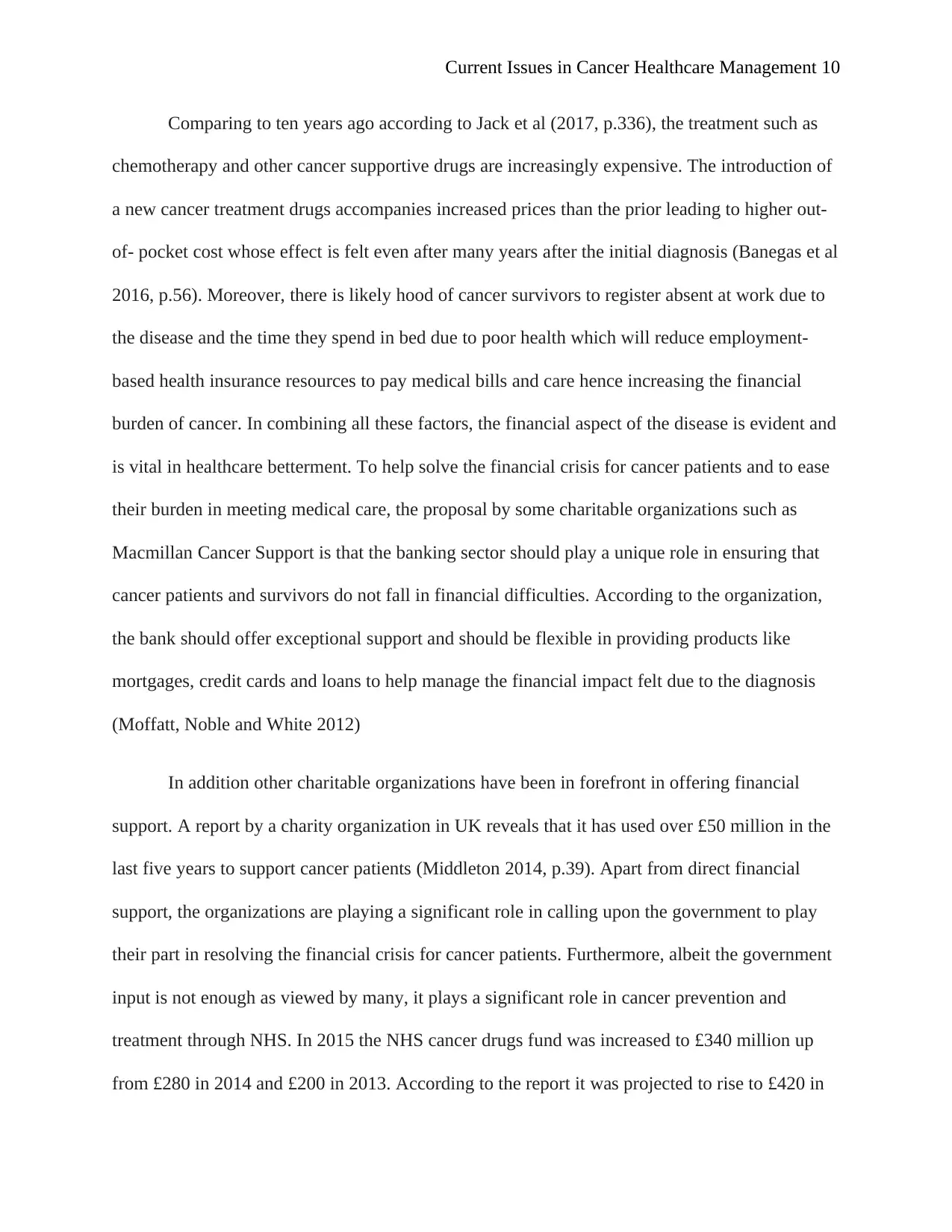
Current Issues in Cancer Healthcare Management 10
Comparing to ten years ago according to Jack et al (2017, p.336), the treatment such as
chemotherapy and other cancer supportive drugs are increasingly expensive. The introduction of
a new cancer treatment drugs accompanies increased prices than the prior leading to higher out-
of- pocket cost whose effect is felt even after many years after the initial diagnosis (Banegas et al
2016, p.56). Moreover, there is likely hood of cancer survivors to register absent at work due to
the disease and the time they spend in bed due to poor health which will reduce employment-
based health insurance resources to pay medical bills and care hence increasing the financial
burden of cancer. In combining all these factors, the financial aspect of the disease is evident and
is vital in healthcare betterment. To help solve the financial crisis for cancer patients and to ease
their burden in meeting medical care, the proposal by some charitable organizations such as
Macmillan Cancer Support is that the banking sector should play a unique role in ensuring that
cancer patients and survivors do not fall in financial difficulties. According to the organization,
the bank should offer exceptional support and should be flexible in providing products like
mortgages, credit cards and loans to help manage the financial impact felt due to the diagnosis
(Moffatt, Noble and White 2012)
In addition other charitable organizations have been in forefront in offering financial
support. A report by a charity organization in UK reveals that it has used over £50 million in the
last five years to support cancer patients (Middleton 2014, p.39). Apart from direct financial
support, the organizations are playing a significant role in calling upon the government to play
their part in resolving the financial crisis for cancer patients. Furthermore, albeit the government
input is not enough as viewed by many, it plays a significant role in cancer prevention and
treatment through NHS. In 2015 the NHS cancer drugs fund was increased to £340 million up
from £280 in 2014 and £200 in 2013. According to the report it was projected to rise to £420 in
Comparing to ten years ago according to Jack et al (2017, p.336), the treatment such as
chemotherapy and other cancer supportive drugs are increasingly expensive. The introduction of
a new cancer treatment drugs accompanies increased prices than the prior leading to higher out-
of- pocket cost whose effect is felt even after many years after the initial diagnosis (Banegas et al
2016, p.56). Moreover, there is likely hood of cancer survivors to register absent at work due to
the disease and the time they spend in bed due to poor health which will reduce employment-
based health insurance resources to pay medical bills and care hence increasing the financial
burden of cancer. In combining all these factors, the financial aspect of the disease is evident and
is vital in healthcare betterment. To help solve the financial crisis for cancer patients and to ease
their burden in meeting medical care, the proposal by some charitable organizations such as
Macmillan Cancer Support is that the banking sector should play a unique role in ensuring that
cancer patients and survivors do not fall in financial difficulties. According to the organization,
the bank should offer exceptional support and should be flexible in providing products like
mortgages, credit cards and loans to help manage the financial impact felt due to the diagnosis
(Moffatt, Noble and White 2012)
In addition other charitable organizations have been in forefront in offering financial
support. A report by a charity organization in UK reveals that it has used over £50 million in the
last five years to support cancer patients (Middleton 2014, p.39). Apart from direct financial
support, the organizations are playing a significant role in calling upon the government to play
their part in resolving the financial crisis for cancer patients. Furthermore, albeit the government
input is not enough as viewed by many, it plays a significant role in cancer prevention and
treatment through NHS. In 2015 the NHS cancer drugs fund was increased to £340 million up
from £280 in 2014 and £200 in 2013. According to the report it was projected to rise to £420 in
Paraphrase This Document
Need a fresh take? Get an instant paraphrase of this document with our AI Paraphraser
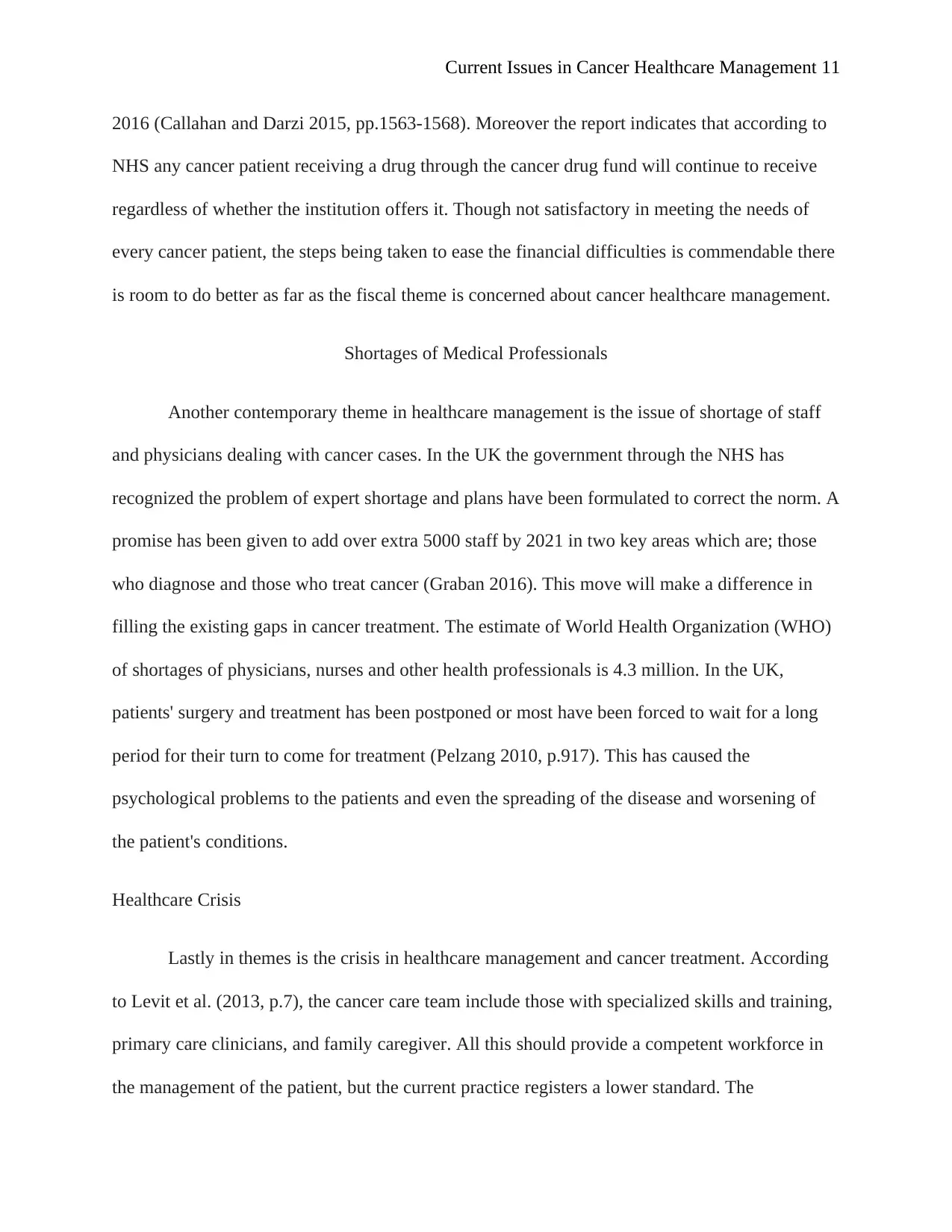
Current Issues in Cancer Healthcare Management 11
2016 (Callahan and Darzi 2015, pp.1563-1568). Moreover the report indicates that according to
NHS any cancer patient receiving a drug through the cancer drug fund will continue to receive
regardless of whether the institution offers it. Though not satisfactory in meeting the needs of
every cancer patient, the steps being taken to ease the financial difficulties is commendable there
is room to do better as far as the fiscal theme is concerned about cancer healthcare management.
Shortages of Medical Professionals
Another contemporary theme in healthcare management is the issue of shortage of staff
and physicians dealing with cancer cases. In the UK the government through the NHS has
recognized the problem of expert shortage and plans have been formulated to correct the norm. A
promise has been given to add over extra 5000 staff by 2021 in two key areas which are; those
who diagnose and those who treat cancer (Graban 2016). This move will make a difference in
filling the existing gaps in cancer treatment. The estimate of World Health Organization (WHO)
of shortages of physicians, nurses and other health professionals is 4.3 million. In the UK,
patients' surgery and treatment has been postponed or most have been forced to wait for a long
period for their turn to come for treatment (Pelzang 2010, p.917). This has caused the
psychological problems to the patients and even the spreading of the disease and worsening of
the patient's conditions.
Healthcare Crisis
Lastly in themes is the crisis in healthcare management and cancer treatment. According
to Levit et al. (2013, p.7), the cancer care team include those with specialized skills and training,
primary care clinicians, and family caregiver. All this should provide a competent workforce in
the management of the patient, but the current practice registers a lower standard. The
2016 (Callahan and Darzi 2015, pp.1563-1568). Moreover the report indicates that according to
NHS any cancer patient receiving a drug through the cancer drug fund will continue to receive
regardless of whether the institution offers it. Though not satisfactory in meeting the needs of
every cancer patient, the steps being taken to ease the financial difficulties is commendable there
is room to do better as far as the fiscal theme is concerned about cancer healthcare management.
Shortages of Medical Professionals
Another contemporary theme in healthcare management is the issue of shortage of staff
and physicians dealing with cancer cases. In the UK the government through the NHS has
recognized the problem of expert shortage and plans have been formulated to correct the norm. A
promise has been given to add over extra 5000 staff by 2021 in two key areas which are; those
who diagnose and those who treat cancer (Graban 2016). This move will make a difference in
filling the existing gaps in cancer treatment. The estimate of World Health Organization (WHO)
of shortages of physicians, nurses and other health professionals is 4.3 million. In the UK,
patients' surgery and treatment has been postponed or most have been forced to wait for a long
period for their turn to come for treatment (Pelzang 2010, p.917). This has caused the
psychological problems to the patients and even the spreading of the disease and worsening of
the patient's conditions.
Healthcare Crisis
Lastly in themes is the crisis in healthcare management and cancer treatment. According
to Levit et al. (2013, p.7), the cancer care team include those with specialized skills and training,
primary care clinicians, and family caregiver. All this should provide a competent workforce in
the management of the patient, but the current practice registers a lower standard. The
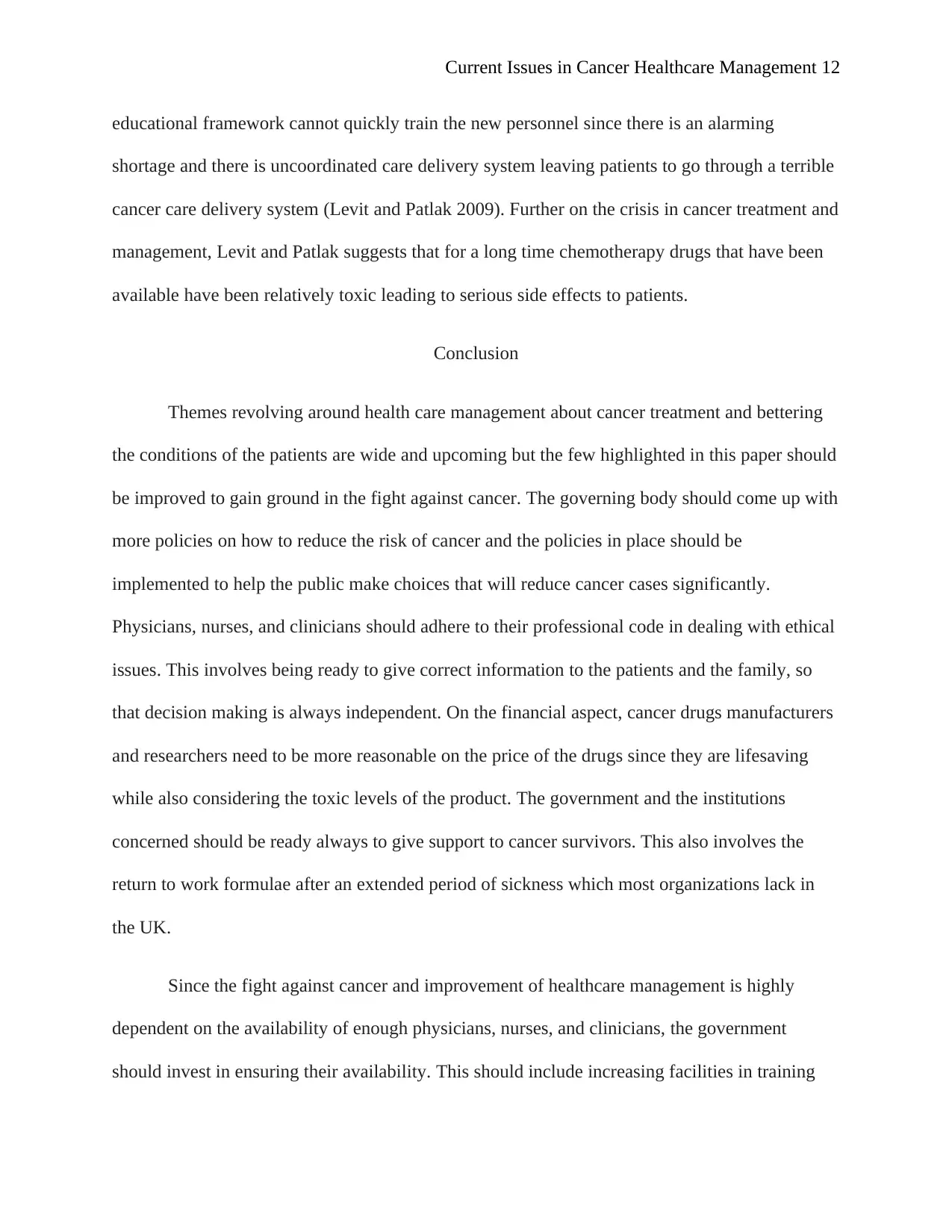
Current Issues in Cancer Healthcare Management 12
educational framework cannot quickly train the new personnel since there is an alarming
shortage and there is uncoordinated care delivery system leaving patients to go through a terrible
cancer care delivery system (Levit and Patlak 2009). Further on the crisis in cancer treatment and
management, Levit and Patlak suggests that for a long time chemotherapy drugs that have been
available have been relatively toxic leading to serious side effects to patients.
Conclusion
Themes revolving around health care management about cancer treatment and bettering
the conditions of the patients are wide and upcoming but the few highlighted in this paper should
be improved to gain ground in the fight against cancer. The governing body should come up with
more policies on how to reduce the risk of cancer and the policies in place should be
implemented to help the public make choices that will reduce cancer cases significantly.
Physicians, nurses, and clinicians should adhere to their professional code in dealing with ethical
issues. This involves being ready to give correct information to the patients and the family, so
that decision making is always independent. On the financial aspect, cancer drugs manufacturers
and researchers need to be more reasonable on the price of the drugs since they are lifesaving
while also considering the toxic levels of the product. The government and the institutions
concerned should be ready always to give support to cancer survivors. This also involves the
return to work formulae after an extended period of sickness which most organizations lack in
the UK.
Since the fight against cancer and improvement of healthcare management is highly
dependent on the availability of enough physicians, nurses, and clinicians, the government
should invest in ensuring their availability. This should include increasing facilities in training
educational framework cannot quickly train the new personnel since there is an alarming
shortage and there is uncoordinated care delivery system leaving patients to go through a terrible
cancer care delivery system (Levit and Patlak 2009). Further on the crisis in cancer treatment and
management, Levit and Patlak suggests that for a long time chemotherapy drugs that have been
available have been relatively toxic leading to serious side effects to patients.
Conclusion
Themes revolving around health care management about cancer treatment and bettering
the conditions of the patients are wide and upcoming but the few highlighted in this paper should
be improved to gain ground in the fight against cancer. The governing body should come up with
more policies on how to reduce the risk of cancer and the policies in place should be
implemented to help the public make choices that will reduce cancer cases significantly.
Physicians, nurses, and clinicians should adhere to their professional code in dealing with ethical
issues. This involves being ready to give correct information to the patients and the family, so
that decision making is always independent. On the financial aspect, cancer drugs manufacturers
and researchers need to be more reasonable on the price of the drugs since they are lifesaving
while also considering the toxic levels of the product. The government and the institutions
concerned should be ready always to give support to cancer survivors. This also involves the
return to work formulae after an extended period of sickness which most organizations lack in
the UK.
Since the fight against cancer and improvement of healthcare management is highly
dependent on the availability of enough physicians, nurses, and clinicians, the government
should invest in ensuring their availability. This should include increasing facilities in training
⊘ This is a preview!⊘
Do you want full access?
Subscribe today to unlock all pages.

Trusted by 1+ million students worldwide
1 out of 19
Related Documents
Your All-in-One AI-Powered Toolkit for Academic Success.
+13062052269
info@desklib.com
Available 24*7 on WhatsApp / Email
![[object Object]](/_next/static/media/star-bottom.7253800d.svg)
Unlock your academic potential
Copyright © 2020–2026 A2Z Services. All Rights Reserved. Developed and managed by ZUCOL.





